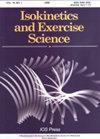Immediate association of navicular bone height and plantar intrinsic muscle size with toe flexion task: An ultrasound-based study
IF 0.7
4区 医学
Q4 ENGINEERING, BIOMEDICAL
引用次数: 0
Abstract
BACKGROUND: Intrinsic foot muscle (IFM) dysfunction and poor foot arch are associated with various foot conditions. Toe flexor exercise (TFE) has been used to improve it; however, the immediate effects of TFE on each IFM and how it relates to changes in navicular bone height (NH) are unclear. OBJECTIVE: This study aimed to investigate acute muscle swelling in the IFM after TFE and the association between changes in NH and IFM size. METHODS: Fourteen adults participated in this study. NH and cross-sectional area (CSA) of the IFM were acquired pre and post- TFE. The CSA of the IFM, including the abductor hallucis (AbH), flexor hallucis brevis, flexor digitorum brevis, and quadratus plantae, was acquired with ultrasonography. In the TFE, each participant completed five sets of eight repetitions with maximum strength. RESULTS: The NH and CSA of all IFM significantly increased significantly post-TFE (p< 0.01). Only the increase in AbH was moderately and positively correlated with the change in NH (r= 0.54, p< 0.01). CONCLUSION: This study suggests that the acute swelling of AbH after TFE is associated with an immediate increase in NH, supporting the important role of AbH in the formation of foot arch.舟骨高度和足底固有肌肉大小与脚趾屈曲任务的直接关联:一项基于超声的研究
背景:足部固有肌(IFM)功能障碍和足弓不良与各种足部状况有关。脚趾屈肌锻炼(TFE)已被用来改善它;然而,TFE对每种IFM的直接影响以及它与舟骨高度(NH)变化的关系尚不清楚。目的:本研究旨在研究TFE后IFM的急性肌肉肿胀以及NH变化与IFM大小之间的关系。方法:14名成年人参与了这项研究。NH和IFM的横截面积(CSA)分别在TFE前后进行测量。IFM的CSA,包括拇展肌(AbH)、拇短屈肌、趾短屈肌和植物方肌,通过超声获得。在TFE中,每个参与者以最大的力量完成了五组八次重复。结果:TFE后所有IFM的NH和CSA均显著增加(p<0.01),只有AbH的增加与NH的变化呈中度正相关(r=0.54,p<0.01)。
本文章由计算机程序翻译,如有差异,请以英文原文为准。
求助全文
约1分钟内获得全文
求助全文
来源期刊

Isokinetics and Exercise Science
医学-工程:生物医学
CiteScore
1.20
自引率
14.30%
发文量
37
审稿时长
>12 weeks
期刊介绍:
Isokinetics and Exercise Science (IES) is an international journal devoted to the study of theoretical and applied aspects of human muscle performance. Since isokinetic dynamometry constitutes the major tool in this area, the journal takes a particular interest in exploring the considerable potential of this technology.
IES publishes studies associated with the methodology of muscle performance especially with respect to the issues of reproducibility and validity of testing, description of normal and pathological mechanical parameters which are derivable from muscle testing, applications in basic research topics such as motor learning paradigms and electromyography. The journal also publishes studies on applications in clinical settings and technical aspects of the various measurement systems employed in human muscle performance research.
The journal welcomes submissions in the form of research papers, reviews, case studies and technical reports from professionals in the fields of sports medicine, orthopaedic and neurological rehabilitation and exercise physiology.
 求助内容:
求助内容: 应助结果提醒方式:
应助结果提醒方式:


